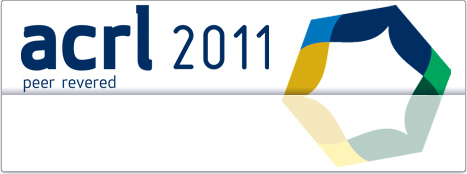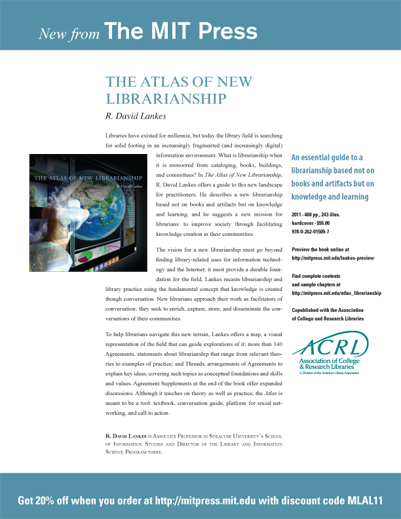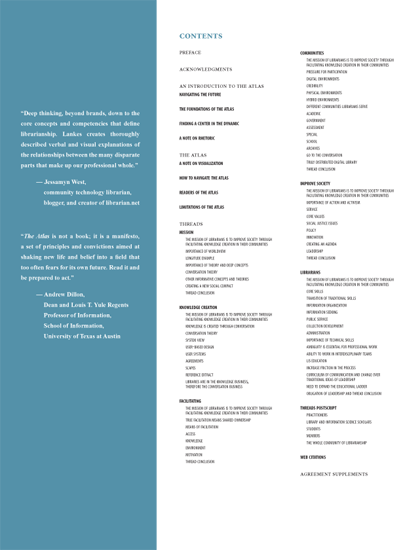Bullet Point: Why Publishers Need Librarians
I have been trying to write this blog post for a week. I want to say something useful in the disappearing ebook issue, but every time I start I turn myself into knots. I am a published author. I really do like the publishers that I have worked with, and think they still serve a purpose. However, what Harper Collins is doing is just – well – stupid.
So I want to publish a rant, but keep feeling like a hypocrite…my published book comes out in a few days – hell, I was a publisher when I ran an ERIC Clearinghouse. Then it hit me. Harper Collins’ move is not a stupid move, it is an unrecognized call for help (mostly unrecognized by Harper Collins). They have no idea how to work in this new open digital environment. They had a business model, skill set, and focus on books. Their customers are changing, the technology is changing, and the future is anything but clear In essence, today’s publishers are the librarians of 5 or 10 years ago.
Expiring ebooks is our equivalent of 300 item long lists of licensed databases, web links organized by Dewey, OPACs that are only open on the web from 9-5 (I’m looking at you Library of Congress). Kindle, Nooks, and iBooks are their Google – the trendy new cool kid that gets the attention, and frankly does one part of their jobs really well. The part the publishers (and librarians used to) see as central.
We shouldn’t be angry with publishers – we should help them see there is life in the digital frontier – that they can be more than their inventory. Just like us. And like us it doesn’t have to be for free (libraries are not free – members pay for them with tuition, taxes, budget lines and so on).
We need to show them that a model of cash for an item derived from artificial scarcity is a short-term business model. The long term is participation and services that helps everyone become a publisher. The value is not in the artifact, digital or analog, but in the knowledge creation process and facilitating it. The value is not in the fact that there is a book, but that that book engages a community. People will pay for the facilitation. Call it editing, production, graphic design, selection, it is all facilitation. The value isn’t in collections it is in memory. It is not in space, but in community gathering. The value isn’t in a website, it’s in what that web site allows you to do. The scarcity they need to be modeling is not in artifacts (titles), but in attention.
Publishers have a hard time ahead. Margins are shrinking, titles are proliferating, and venues to sell their wares are shrinking. eBooks as a concept are quickly disappearing in the face of “the app.” Publishers need to become developers, and community publishers, not gatekeepers, but curators (as we are learning from our museum brethren). To be sure, many publishers are already on this road. From those experimenting with open access, to those producing apps there are folks in publishers that get it. I, for one, hope they make it. I see value in the edited high-production artifact – along side the fan fiction. I see the value in an edited series where the value is in the editor and the contributing authors, not the paper – or digital file.
Librarians we need to help them out. We need to show them how to function in this new world. How libraries are an amazingly valuable physical community presence. After all, when they close the Borders down the street do you see picketers? The only signs I see are 20-30% off. When they close that Blockbusters on the corner do you get angry mobs at city council meetings? That kind of dedication doesn’t come with best sellers, it comes with dedicated professionals who are part of the community and working to improve it. As librarians need to show publishers of all stripes how openness of information helps them. How books are not information – they are tools to learning (about the world and oneself).
And if we can’t show them? Well then I ask librarians – how is tying our future, brand, and business model that has evolved and existed for over 3,000 years to one that is short term, in rapid transition, and ultimately short sighted a good idea? To read some of the blogs and articles you’d think that if the latest Dan Brown novel isn’t available through OverDrive we might as well shutter the doors. Why not go to Dan Brown and talk to him about a publishing platform where he gets 90% of book revenue and his work is guaranteed to be accessible in 100 years? Oh, and by the way marketing opportunities in every city, town, and hamlet in the country.
Of course to do this we will need to build our own publishing platform (OR PARTNER WITH PUBLISHERS WHO SEE THE LONG TERM). The hardware platforms already exists (iPad, iPhone, Android, etc). The distribution network is already there and subsidized by consumers (3G networks, WiFi). Even the standards are there (like Adobe’s ebook standards to make authors feel comfortable). We can even show, over the long term, how a new model of engagement with readers wins over DRM.
In the short term will we be low on Best Sellers? Yup. Will such a system allow for a wide range of quality in published materials? You bet. Will librarians need to work across geographical and organizational borders to get an economy of size? Absolutely.
Is there room in this world for publishers? Amazon? Apple? Barnes & Noble? Yes, but not if they see librarians as the enemy, or seek to protect an ever dwindling profit and market instead of advocating for a better future. You know what MIT Press said when I told them I wanted to co-publish with ACRL? “Great!” You know what they and ACRL said when I told them we’d give away half the book, or slim down the margins to get the cost of the book under $60? “Bring it on”. Know what they both said when I told them we were going to build an App? “How did you do that – we’d like to share?” I know there are more folks like MIT Press and ACRL out there. I see publishers of all stripes that once balked at sharing metadata, now offering full text indexing to vendors.
The next Dan Brown, or Ernest Hemingway, or Dr. Seuss might be in your library right now…what are you doing to help them find their voice in the future? What are doing to become the publisher of your community?
So what’s the action plan?
Stop talking (or forming a committee or doing an environmental scan) and start doing.
Prototype an ebook platform now. Can’t write an app? Do it in PowerPoint as screenshots. Think app, not book. Think social not bed time.
Develop a community centric acquisition policy. Do NOT do this without said community. Every library that is boycotting any publisher better have their community standing right with you. That community should be willing to forego those books in your library and their personal Kindles. Remember that authors are part of that community.
Invite the publishers to play. Know a great publisher? Give them a shout out. All my academic library brethren we need our academic presses on board.
Every dollar you don’t spend with a boycotted publisher ? Pool it together into a field wide innovation fund. $100k, and buy in by library consortia, and vendors and we have an amazing platform in three months. Project Gutenberg? Invited. HathiTrust? Invited. OCLC? Invited. Overdrive? Invited. SerialSolutions? Small Town America? State Library? MIT Press? Our Members? Invited.
Not invited? Annoyed librarians who think libraries have no power. “Publishers/Amazon/Apple/Whomever will never change” they’ll say. Just like Music companies will never get rid of DRM or movie studios will never agree to stream movies. Times change. But not on their own. WE MUST CHANGE THEM! YOU must change them.
One of the first times I presented the mission of librarians as improving society through facilitating knowledge creation in their communities a publisher said that it could stand for his organization as well. I agree, but only if we truly share the same commitment to improve society. The same commitment to knowledge and most of all community. A community is not a set of customers. A community is a set of participants and members always learning and always creating, not mindlessly consuming – wallets with a face (or a borrower with a library card).
Librarians it is time for us to serve by innovating and leading!





